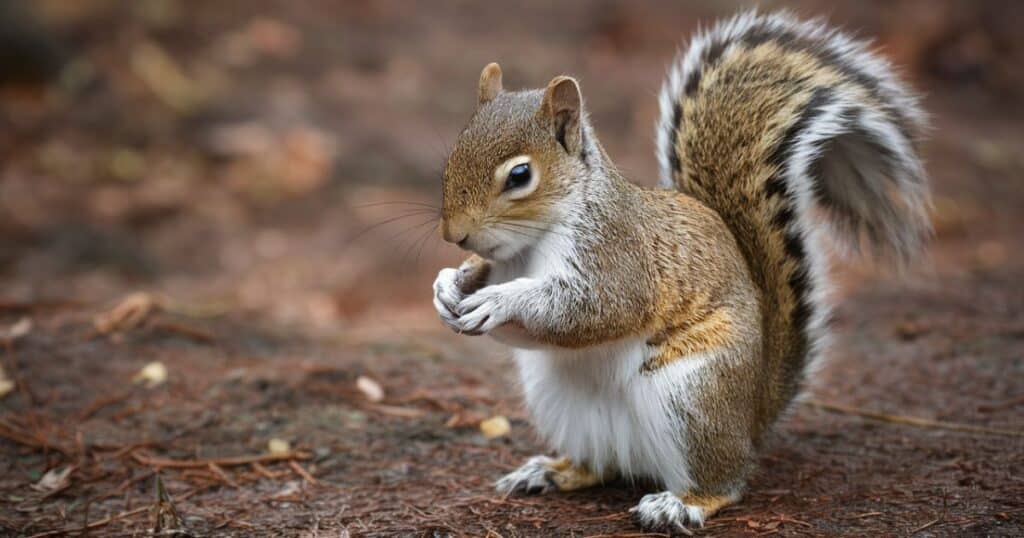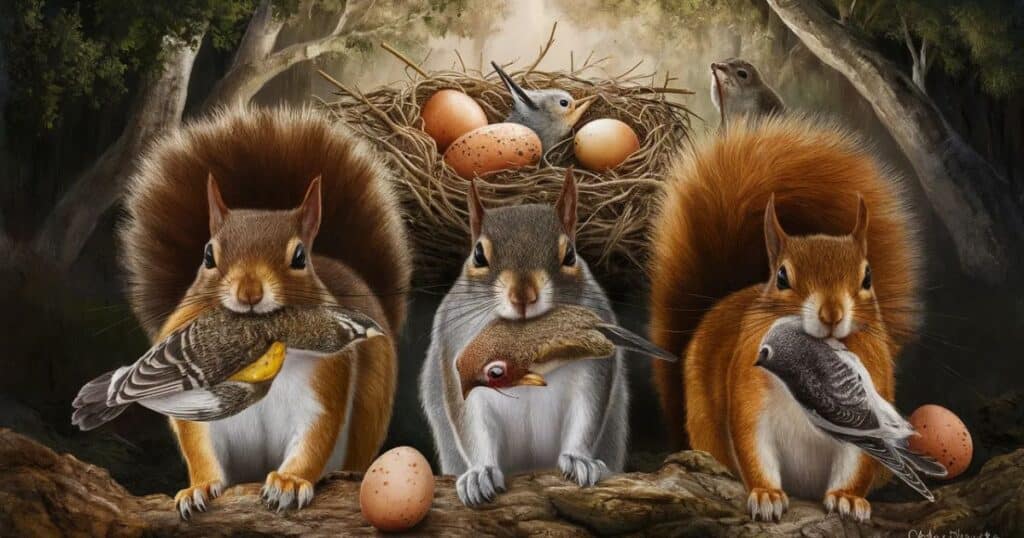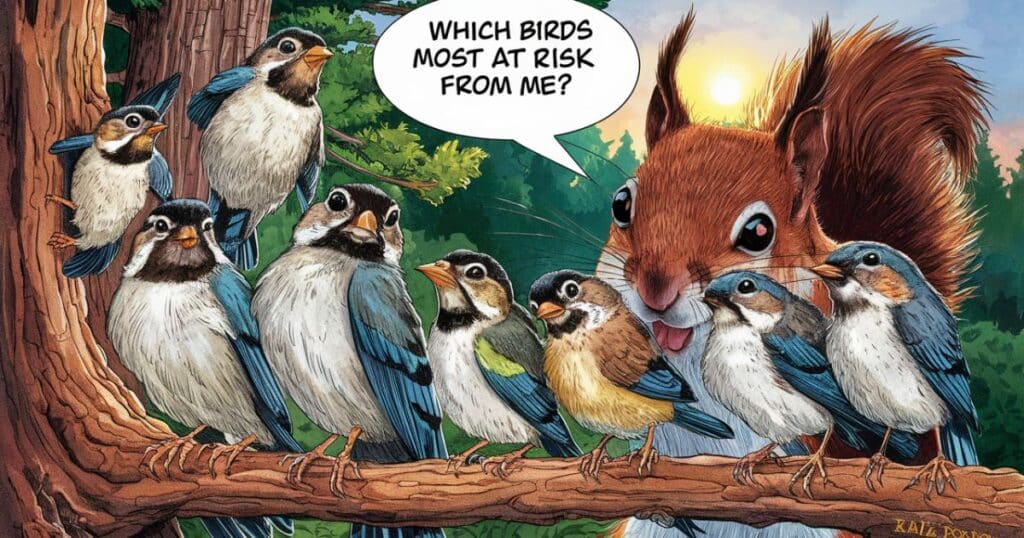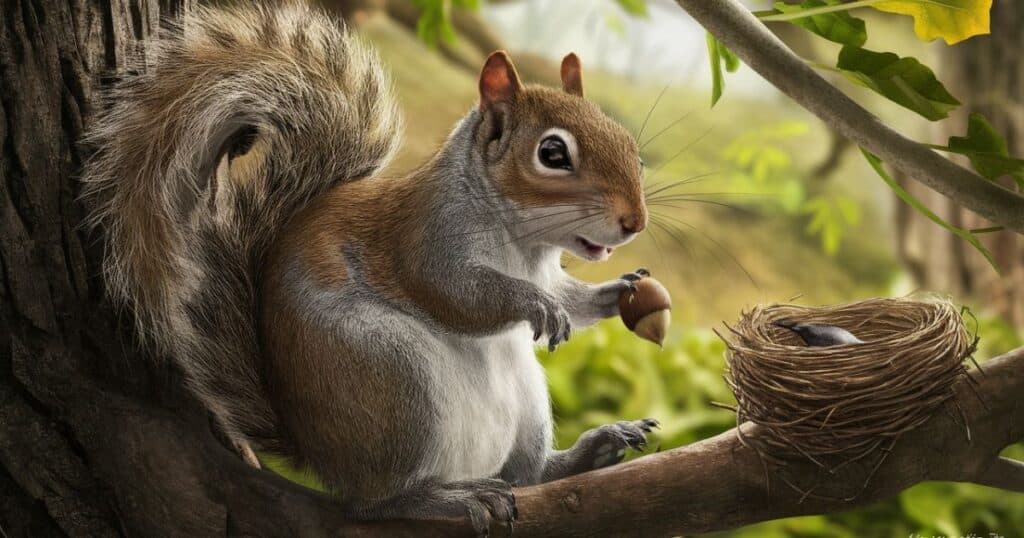Are you an avid bird watcher who constantly refills your feeders, only to find suspicious eggshell remains scattered nearby? You may have a squirrel prowler raiding neighborhood nests for a protein-packed meal. While squirrels have a reputation as acrobatic nut-gatherers, these clever omnivores aren’t opposed to supplementing their diet with eggs and nestlings when opportunities arise.
In this comprehensive guide, we’ll delve into the fascinating and sometimes controversial topic of squirrels eating bird eggs. From unraveling their motivations to understanding which bird species face the highest risks, you’ll gain insight into this complex ecological relationship. So, let’s ruffle some feathers and explore the world of squirrel nest predators!
What Are Squirrels?

Before we dive into their dietary habits, let’s quickly familiarize ourselves with these ubiquitous backyard visitors. Squirrels are small, agile rodents belonging to the Sciuridae family, which includes tree squirrels, ground squirrels, and flying squirrels.
| Species | Characteristics |
| Eastern Gray Squirrel | Large bushy tails, gray fur with white underside |
| Fox Squirrel | Reddish-brown coat, one of the largest tree squirrel species |
| Red Squirrel | Smaller, reddish fur, boisterous territorial behavior |
| Southern Flying Squirrel | Ability to glide using furry membrane, nocturnal |
Various squirrel species found in backyards across the US and UK.
These energetic rodents are well-adapted to urban and suburban environments, thriving near human habitats where food sources like bird feeders, gardens, and trash cans abound. Their dexterity, intelligence, and adaptability allow them to coexist alongside human populations successfully.
MORE POST: A Bird Just Shat On My Sister’s Face: Decoding Nature’s Unexpected Surprise
Dietary Habits of Squirrels in the Backyard
While squirrels are primarily herbivorous, their diets can be quite diverse, especially in backyard settings. Their typical fare includes:
- Nuts and Seeds: Acorns, walnuts, hickory nuts, and a variety of seeds provide vital fats and proteins.
- Fruits and Vegetables: Squirrels enjoy snacking on apples, berries, corn, and other garden produce when available.
- Fungi and Bark: Some squirrel species consume mushrooms and strip tree bark for nutrients.
- Insects and Eggs: As omnivores, squirrels will opportunistically hunt insects, raid bird nests for eggs or nestlings.
Squirrels are also known for their remarkable food-caching behaviors. They bury or hide nuts and seeds in scattered locations, creating a natural pantry for leaner times. This instinct, combined with their opportunistic foraging habits, contributes to their success as suburban residents.
The Diet of Squirrels: A Closer Look
squirrels have a diverse palate, their diet largely depends on what’s readily available in their local environment. In urban and suburban areas, squirrels often take advantage of human-provided food sources like:
- Bird Feeders: Squirrels are notorious for raiding bird feeders, stealing seeds, suet, and even entire feeders if they can.
- Pet Food: Dry cat or dog food left outdoors can be an irresistible buffet for hungry squirrels.
- Gardens and Orchards: Squirrels pillage fruits, vegetables, and ornamental plants, often causing frustration for gardeners.
- Trash and Compost: Squirrels will scavenge for discarded food scraps, making them common visitors to outdoor trash cans and compost piles.
When their preferred plant-based foods are scarce, squirrels become even more opportunistic, turning to alternative protein sources like:
- Insects and Larvae: Squirrels will hunt for grubs, caterpillars, and other insects hiding under bark or in the soil.
- Bird Eggs and Nestlings: As we’ll explore further, squirrels are known to raid bird nests for eggs and baby birds.
- Carrion: Squirrels may scavenge on roadkill, animal carcasses, or other decaying matter when food is limited.
This omnivorous flexibility allows squirrels to thrive in diverse environments, adapting their diets to the available resources.
Why Do Squirrels Eat Bird Eggs?
the thought of a squirrel pillaging a delicate bird’s nest may seem distressing, there are several reasons why these clever rodents engage in this behavior:
- Shortage of Preferred Food Sources: When nuts, seeds, and other plant-based foods become scarce, squirrels seek out alternative protein sources like eggs and nestlings to supplement their diets. This is especially common during lean seasons like early spring before new plant growth emerges.
- Opportunistic Foraging: Squirrels are highly opportunistic foragers, quick to take advantage of any accessible food source, including unprotected bird nests. Their keen senses and agility allow them to locate and raid nests efficiently.
- Nutrient Needs: Bird eggs provide essential nutrients like protein, calcium, and other minerals that are vital for squirrel growth, reproduction, and overall health. Nursing female squirrels, in particular, require a protein-rich diet to support their litters.
- Easy-to-Spot Nests: Unlike well-camouflaged insect or small animal prey, bird nests are often relatively easy for squirrels to detect visually. Their conspicuous locations, combined with the squirrels’ keen eyesight and climbing abilities, make them vulnerable targets.
While some may view squirrels as egg-thieves, it’s important to remember that they are simply acting on their natural instincts and opportunistic tendencies as omnivorous foragers.
Can Squirrels Kill Adult Birds?
While squirrels primarily target unguarded eggs and nestlings, there have been rare instances where they may attack and kill adult birds. However, this behavior is generally limited to specific circumstances:
- Nest Defense: If a nesting bird aggressively confronts a squirrel raiding its nest, the squirrel may lash out in self-defense, potentially injuring or killing the bird.
- Territory Disputes: During breeding seasons, squirrels can become highly territorial, sometimes engaging in physical confrontations with birds encroaching on their claimed areas.
- Opportunistic Predation: In extremely rare cases, a squirrel may attempt to prey on a sick, injured, or very young/small adult bird if the opportunity arises.
For the most part, however, healthy adult birds are generally not at significant risk of being killed by squirrels. Their larger size, flight abilities, and defensive behaviors (like mobbing) typically deter squirrels from engaging in direct attacks.
Squirrels as Predators: Do They Eat Baby Birds or Just Eggs?

While squirrels are primarily interested in the nutritious eggs found in bird nests, they may also opportunistically consume nestlings or fledglings if they encounter them.
Newly hatched baby birds, still confined to the nest and lacking feathers or mobility, are particularly vulnerable to squirrel raids. As the nestlings grow and develop their feathers, squirrels become less likely to target them, as the increased activity and defensive behavior of the parents make nest raids more challenging.
However, even fledglings (young birds just leaving the nest) can sometimes fall victim to opportunistic squirrel predation, especially if they are ill, injured, or have fallen from their nests onto the ground.
It’s important to note that while squirrels may occasionally prey on nestlings or fledglings, they are not typically a major threat to overall bird populations. Their nest-raiding activities are more akin to those of other common nest predators like snakes, raccoons, or blue jays.
What Types of Squirrels Eat Bird Eggs?
While all squirrel species share an omnivorous diet, some are more notorious for their egg-eating habits than others. Here are a few common culprits:
- Eastern Gray Squirrels: One of the most widespread and abundant squirrel species in North America, gray squirrels are frequent offenders when it comes to raiding bird nests for eggs and nestlings.
- Fox Squirrels: These larger tree squirrels, with their reddish-brown coats, are also known to opportunistically plunder bird nests in their territories.
- Red Squirrels: Despite their smaller size, the feisty red squirrels are tenacious nest raiders, especially in coniferous forest habitats.
- Southern Flying Squirrels: These nocturnal gliders may take advantage of unguarded bird nests under the cover of darkness, snatching eggs or nestlings.
It’s worth noting that while all squirrel species can potentially raid nests, some individuals or local populations may develop stronger egg-eating habits than others based on available food sources and learned behaviors within their social groups.
Which Birds Are Most at Risk From Squirrels?

Not all bird species face equal threats from squirrel nest predators. Several factors can make certain birds more vulnerable to having their nests raided:
- Nest Location: Birds that build exposed, open-cup nests in trees or shrubs are at higher risk, as these nests are more accessible and visible to squirrels. Ground-nesting birds may also be targeted.
- Nest Defense: Some bird species, like robins or mockingbirds, are more aggressive in defending their nests, deterring potential squirrel raids. Less defensive birds are easier targets.
- Nest Camouflage: Well-concealed or camouflaged nests are less likely to be detected by squirrels’ keen eyesight.
- Nest Type: Cavity-nesting birds, like woodpeckers or bluebirds, have better protection from squirrel raids compared to open-cup nesters.
- Size and Aggression: Smaller, less aggressive songbirds are generally more vulnerable prey than larger, more defensive species like crows or hawks.
Some commonly targeted bird species include robins, cardinals, mourning doves, and other backyard songbirds that build exposed cup nests in shrubs or low-hanging trees. However, squirrels are opportunistic, and few bird species are entirely safe from potential nest raids.
What Birds Are Squirrels Afraid Of?
While squirrels may seem fearless when plundering bird feeders, there are certain avian species that can strike fear into these furry foragers:
- Hawks and Owls: As natural predators of squirrels, the mere presence of a hawk or owl in the area can send squirrels scrambling for cover. Their sharp talons and beaks pose a real threat.
- Crows and Ravens: These large, highly intelligent birds are known for their aggressive mobbing behavior, swarming and harassing potential threats like squirrels near their nests.
- Blue Jays and Mockingbirds: Similarly to crows, these feisty songbirds will loudly mob and chase away squirrels encroaching on their territories during nesting seasons.
Squirrels have an innate fear of these predatory or highly defensive bird species and will generally avoid areas where they are actively nesting or frequently present. The loud calls and aggressive behaviors of these birds can effectively deter squirrel nest raids.
How Do Birds Protect Themselves From Squirrel Predators?
While some birds rely on sheer aggression or the presence of larger avian protectors, others have developed more subtle strategies to safeguard their nests from squirrel intruders:
- Nest Concealment: Many birds carefully select dense foliage or cavities to build well-hidden, camouflaged nests that are difficult for squirrels to locate visually.
- Nest Defense: Loud alarm calls, aggressive swooping/mobbing behaviors, and actively attacking intruders can discourage squirrels from approaching active nests.
- Diversionary Tactics: Some bird parents may feign injury or lead predators away from nest sites through distraction displays.
- Social Nesting: Colonial nesters like herons or weavers can benefit from the shared vigilance and nest defense of multiple breeding pairs.
- Nest Boxes and Baffles: Providing appropriate nest boxes or affixing predator baffles/guards on trees can deter squirrels from accessing cavity nests.
Ultimately, a combination of concealment, vigilance, and aggressive nest defense provides the best protection for birds against opportunistic squirrel egg-thieves.
How to Help Protect Bird Eggs from Squirrels
For avid bird enthusiasts and backyard wildlife lovers, witnessing a squirrel raid can be disheartening. While some nest predation is natural, there are steps you can take to help protect your feathered friends:
- Carefully Place Bird Feeders: Position feeders at least 6-8 feet from trees, fences, or other potential squirrel launch pads to make access more difficult.
- Use Squirrel-Proof Feeders: Invest in weight-sensitive, enclosed, or baffled feeders designed to restrict squirrel access while allowing smaller birds to feed.
- Scare Squirrels Away: Loud noises, motion-activated deterrents, or even temporary removal of feeders can discourage bold squirrels from frequenting nesting areas.
- Provide Nest Boxes: Install appropriate nest boxes or brushpile shelters to offer alternative, safer nesting sites for cavity-dwelling bird species.
- Plant Deer-Resistant Shrubs: Dense, thorny vegetation like hollies or barberries can create protective barriers around low nests.
- Monitor Vulnerable Nests: Keep an eye on accessible nests during egg-laying and early nestling stages when they are most vulnerable to raids.
- Allow Natural Deterrents: Welcoming hawks, owls, and aggressive jays/mockingbirds to your yard can provide natural squirrel deterrents during nesting seasons.
Remember, some level of squirrel nest predation is natural and inevitable. The key is to strike a balance, allowing these adaptable urban wildlife residents to coexist while taking reasonable steps to protect vulnerable bird populations.
Do Squirrels Adversely Affect Bird Populations?
While the sight of a squirrel raiding a bird’s nest can be distressing, it’s important to consider the broader ecological context. Research suggests that squirrel nest predation, while impactful on individual nests, does not typically pose a significant threat to overall bird population numbers.
Several factors contribute to this:
- Compensatory Mechanisms: Many bird species have adapted to nest predation by producing multiple broods per season or renesting quickly after failed attempts. This compensatory reproduction helps offset losses.
- Density-Dependent Effects: Nest predation can sometimes regulate overly dense bird populations, allowing surviving offspring better access to resources and increased chances of survival.
- Other Predator Impacts: Squirrels are just one of many nest predators, including snakes, raccoons, and other bird species. Their cumulative impact is relatively minor compared to habitat loss and other human-driven factors affecting bird populations.
- Spatial and Temporal Variations: Squirrel densities and nest predation rates can vary significantly between locations and across different seasons or years, preventing prolonged, concentrated impacts on specific bird populations.
While individual nest losses can be emotionally distressing for bird enthusiasts, most researchers agree that squirrel nest predation does not typically cause significant, long-term declines in overall bird numbers at a population level.
However, it’s important to note that for rare, threatened, or endangered bird species with already critically low populations, even modest levels of nest predation can potentially hinder recovery efforts.
Conclusion:
While the thought of squirrels raiding bird nests may evoke strong emotions in avian enthusiasts, it’s essential to approach the issue objectively. Squirrels, like many urban-adapted wildlife species, are simply following their natural instincts as opportunistic omnivores.
By understanding their motivations, identifying vulnerable bird species, and implementing reasonable protective measures, we can strike a balance that allows for the coexistence of these remarkable backyard residents.
Ultimately, appreciating the complex ecological roles of both birds and squirrels, and recognizing the resilience of most bird populations, can help us find harmony in our shared environments.
So, the next time you witness a squirrel’s audacious nest raid, take a moment to marvel at nature’s intricate web of relationships. These interactions, while sometimes disruptive, are part of the delicate dance that has unfolded for millennia in our urban ecosystems.
With a little understanding and proactive nest protection, we can ensure that the delightful melodies of our feathered friends continue to grace our neighborhoods for generations to come, despite the occasional opportunistic egg-thief.
ALSO READ THIS POST: The Mysterious Opium Bird: Is It Real Or Just A Tall Tale?
FAQ’s
Do squirrels eat eggs from bird nests?
Yes, squirrels are known to raid bird nests and consume eggs as well as nestlings when available, acting as opportunistic omnivores seeking additional protein sources.
What eats bird eggs out of the nest?
Common nest predators that feed on bird eggs include squirrels, snakes, raccoons, opossums, crows, jays, and even some larger bird species like hawks or owls.
How to protect bird nests from squirrels?
Place feeders away from nesting areas, use squirrel-proof feeders, provide nest boxes/baffles, plant dense shrubs around nests, and use deterrents like noise or motion-activated devices to discourage squirrels.
Do birds and squirrels get along?
Generally, no – while they may coexist, birds view squirrels as threats to their nests and will aggressively defend against them through mobbing, loud calls, and attacking intruders near the nest.
Do coffee grounds keep squirrels away?
Coffee grounds can help deter squirrels to some extent, as they dislike the strong bitter smell. However, they may not be a complete deterrent on their own and are most effective when used alongside other repellent methods.
What scent do squirrels hate?
Squirrels have a strong sense of smell and tend to avoid pungent or unpleasant odors. Some scents they dislike include capsaicin (from cayenne pepper), vinegar, ammonia, and the smell of predators like coyotes or foxes.

Davin Connor is an experienced author with 3 years in pets writing. Known for concise, informative content, he shares expertise on pet care, behavior, and health through his engaging articles.






